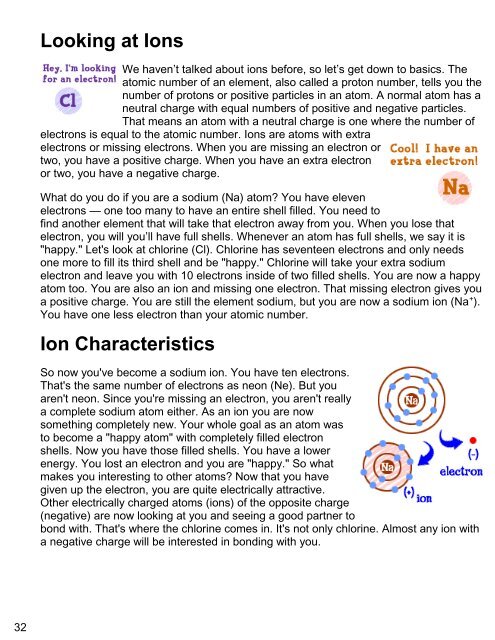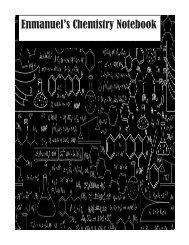Create successful ePaper yourself
Turn your PDF publications into a flip-book with our unique Google optimized e-Paper software.
Looking at Ions<br />
We haven’t talked about ions before, so let’s get down to basics. The<br />
atomic number of an element, also called a proton number, tells you the<br />
number of protons or positive particles in an atom. A normal atom has a<br />
neutral charge with equal numbers of positive and negative particles.<br />
That means an atom with a neutral charge is one where the number of<br />
electrons is equal to the atomic number. Ions are atoms with extra<br />
electrons or missing electrons. When you are missing an electron or<br />
two, you have a positive charge. When you have an extra electron<br />
or two, you have a negative charge.<br />
What do you do if you are a sodium (Na) atom? You have eleven<br />
electrons — one too many to have an entire shell filled. You need to<br />
find another element that will take that electron away from you. When you lose that<br />
electron, you will you’ll have full shells. Whenever an atom has full shells, we say it is<br />
"happy." Let's look at chlorine (Cl). Chlorine has seventeen electrons and only needs<br />
one more to fill its third shell and be "happy." Chlorine will take your extra sodium<br />
electron and leave you with 10 electrons inside of two filled shells. You are now a happy<br />
atom too. You are also an ion and missing one electron. That missing electron gives you<br />
a positive charge. You are still the element sodium, but you are now a sodium ion (Na + ).<br />
You have one less electron than your atomic number.<br />
Ion Characteristics<br />
So now you've become a sodium ion. You have ten electrons.<br />
That's the same number of electrons as neon (Ne). But you<br />
aren't neon. Since you're missing an electron, you aren't really<br />
a complete sodium atom either. As an ion you are now<br />
something completely new. Your whole goal as an atom was<br />
to become a "happy atom" with completely filled electron<br />
shells. Now you have those filled shells. You have a lower<br />
energy. You lost an electron and you are "happy." So what<br />
makes you interesting to other atoms? Now that you have<br />
given up the electron, you are quite electrically attractive.<br />
Other electrically charged atoms (ions) of the opposite charge<br />
(negative) are now looking at you and seeing a good partner to<br />
bond with. That's where the chlorine comes in. It's not only chlorine. Almost any ion with<br />
a negative charge will be interested in bonding with you.




